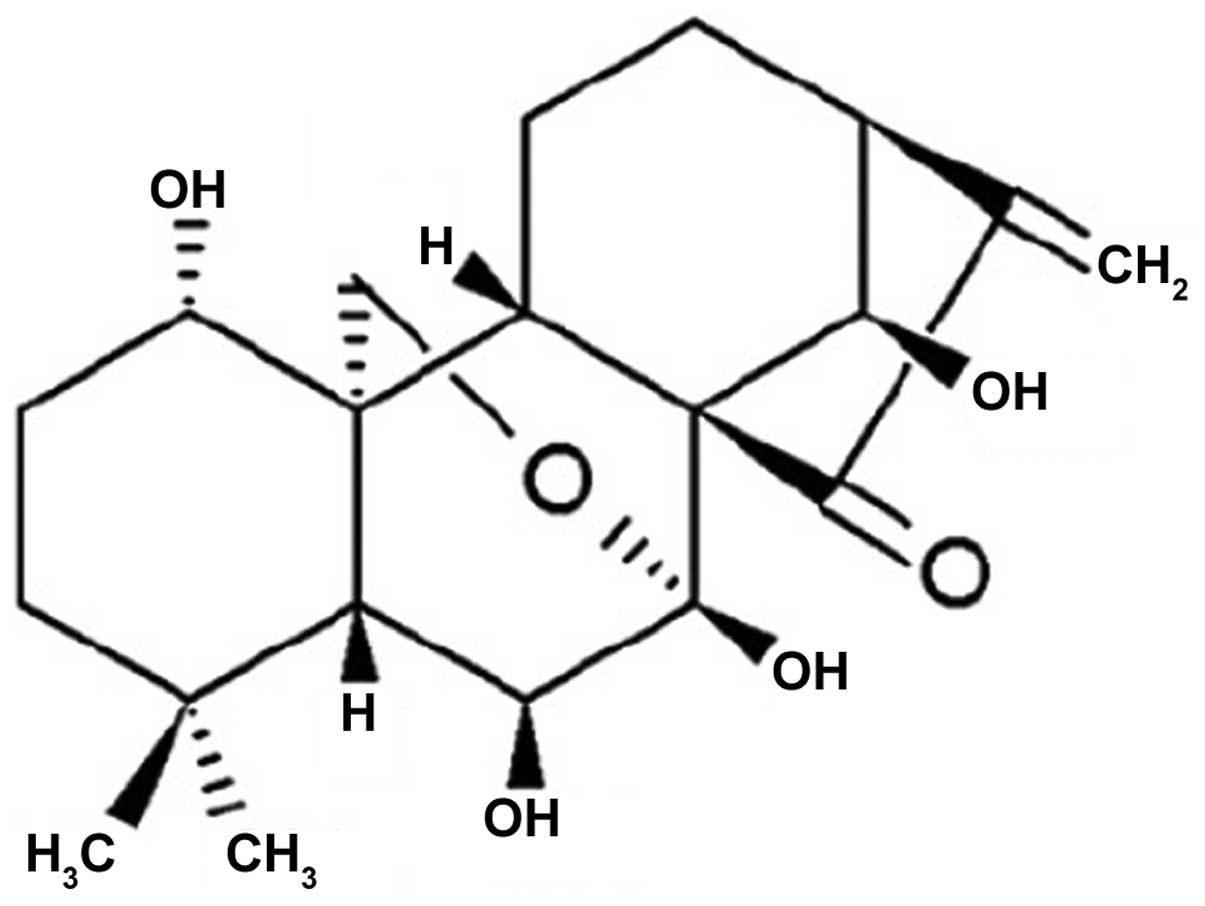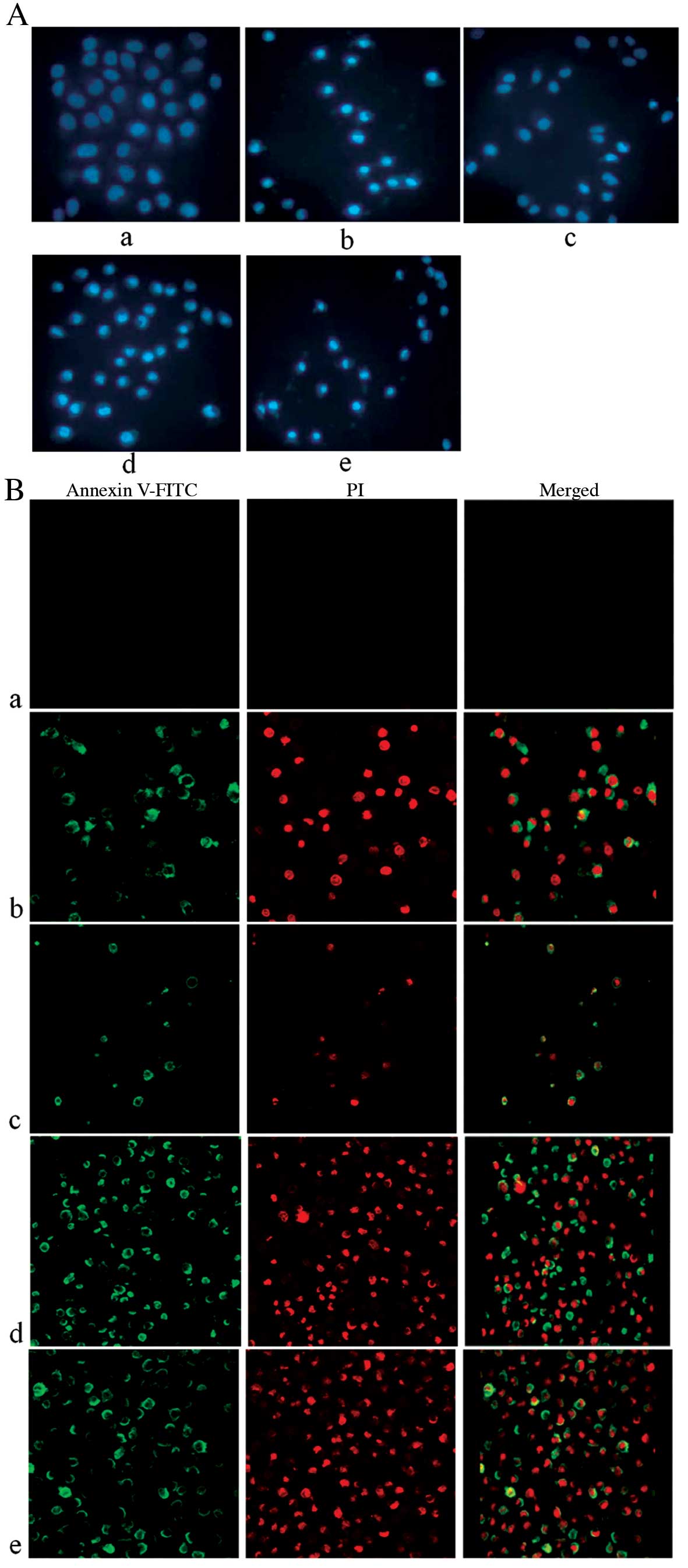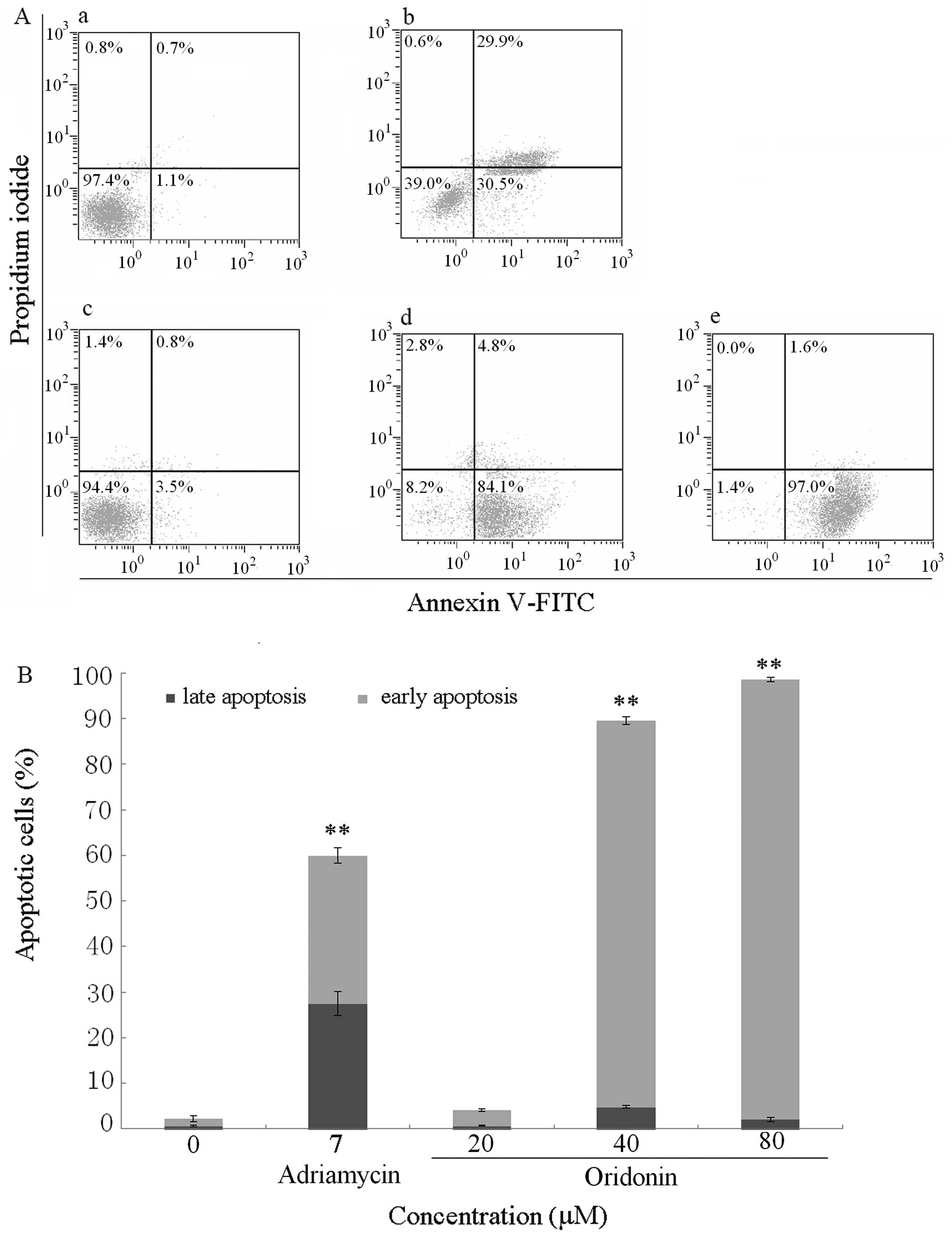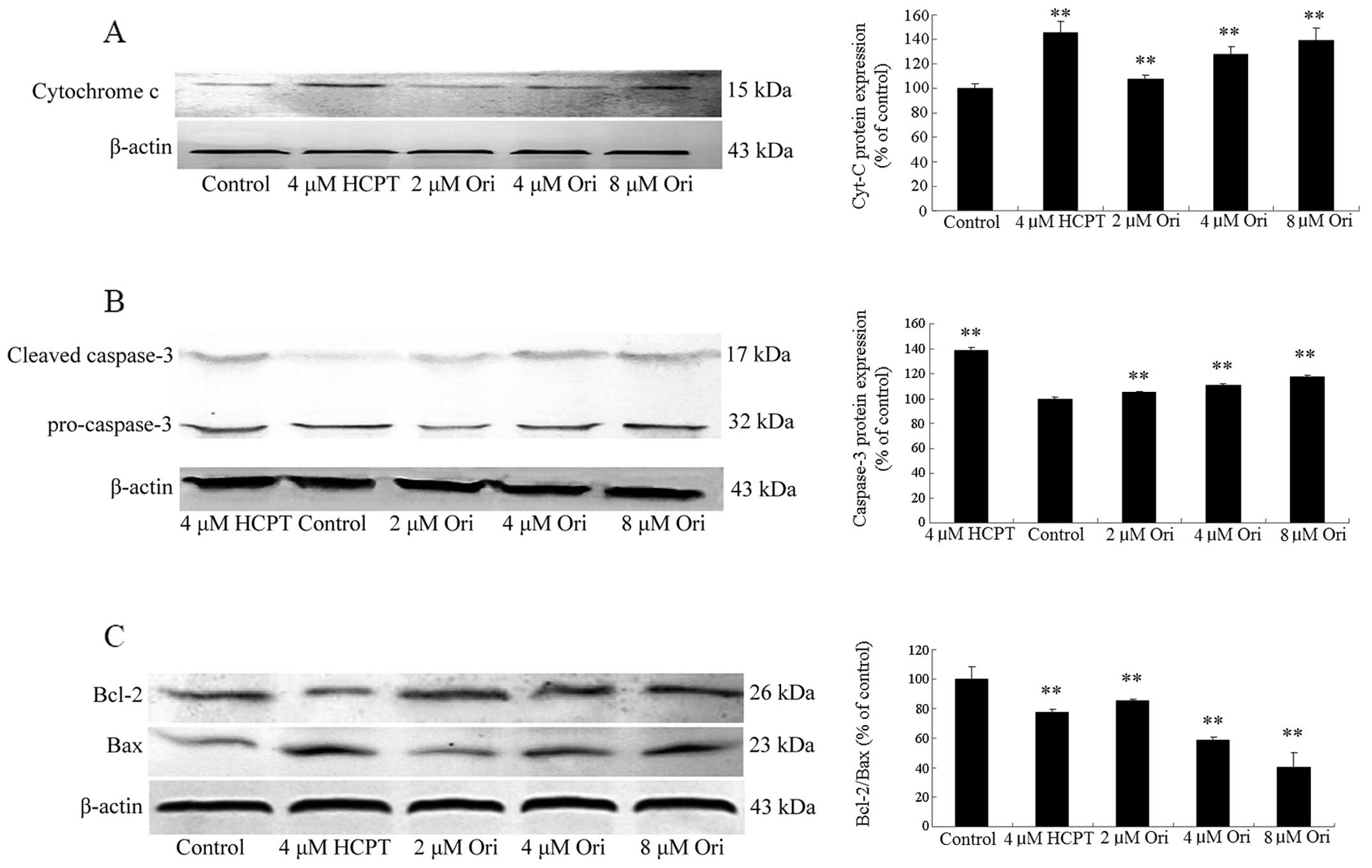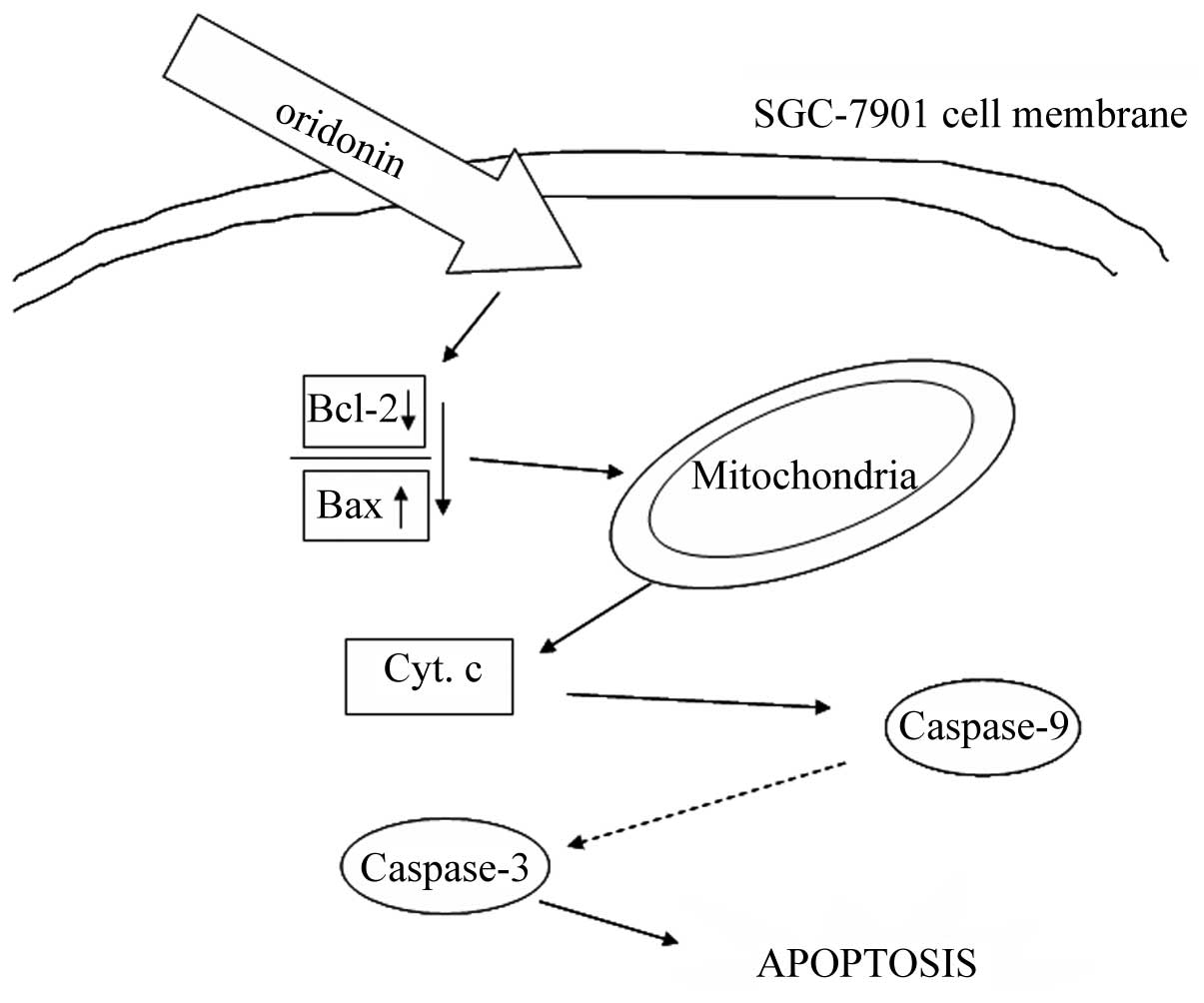|
1
|
Torre LA, Bray F, Siegel RL, Ferlay J,
Lortet-Tieulent J and Jemal A: Global cancer statistics, 2012. CA
Cancer J Clin. 65:87–108. 2015. View Article : Google Scholar : PubMed/NCBI
|
|
2
|
Fitzmaurice C, Dicker D, Pain A, Hamavid
H, Moradi-Lakeh M, MacIntyre MF, Allen C, Hansen G, Woodbrook R,
Wolfe C, et al; Global Burden of Disease Cancer Collaboration. The
global burden of cancer 2013. JAMA Oncol. 1:505–527. 2015.
View Article : Google Scholar : PubMed/NCBI
|
|
3
|
Gao SY, Li J, Qu XY, Zhu N and Ji YB:
Downregulation of Cdk1 and cyclinB1 expression contributes to
oridonin-induced cell cycle arrest at G2/M phase and growth
inhibition in SGC-7901 gastric cancer cells. Asian Pac J Cancer
Prev. 15:6437–6441. 2014. View Article : Google Scholar : PubMed/NCBI
|
|
4
|
Xu PY, Zhao GX and Chang LS: Local
thermotherapy with rabdosia liquid as prophylactic measure for
recurrence of superficial urinary bladder carcinoma: A
non-randomized contemporary controlled study. Zhongguo Zhong Xi Yi
Jie He Za Zhi. 25:1115–1117. 2005.(In Chinese).
|
|
5
|
Wang RL: A report of 40 cases of
esophageal carcinoma surviving for more than 5 years after
treatment with drugs. Zhonghua Zhong Liu Za Zhi. 15:300–302.
1993.(In Chinese). PubMed/NCBI
|
|
6
|
Wang RL, Gao BL, Xiong ML, Mei QD, Fan KS,
Zuo ZK, Lang TL, Gao GQ, Ji ZC, Wei DC, et al: Potentiation by
Rabdosia rubescens on chemotherapy of advanced esophageal
carcinoma. Zhonghua Zhong Liu Za Zhi. 8:297–299. 1986.(In Chinese).
PubMed/NCBI
|
|
7
|
de la Taille A, Hayek OR, Burchardt M,
Burchardt T and Katz AE: Role of herbal compounds (PC-SPES) in
hormone-refractory prostate cancer: Two case reports. J Altern
Complement Med. 6:449–451. 2000. View Article : Google Scholar : PubMed/NCBI
|
|
8
|
Lou H, Gao L, Wei X, Zhang Z, Zheng D,
Zhang D, Zhang X, Li Y and Zhang Q: Oridonin nanosuspension
enhances anti-tumor efficacy in SMMC-7721 cells and H22 tumor
bearing mice. Colloids Surf B Biointerfaces. 87:319–325. 2011.
View Article : Google Scholar : PubMed/NCBI
|
|
9
|
Wang C, Jiang L, Wang S, Shi H, Wang J,
Wang R, Li Y, Dou Y, Liu Y, Hou G, et al: The antitumor activity of
the novel compound jesridonin on human esophageal carcinoma cells.
PLoS One. 10:e01302842015. View Article : Google Scholar : PubMed/NCBI
|
|
10
|
Shen J, Zhang D, Zhao Z, Jia L, Zheng D,
Liu G, Hao L, Zhang Q, Tian X, Li C, et al: Synthesis,
characterization, in vitro and in vivo evaluation of PEGylated
oridonin conjugates. Int J Pharm. 456:80–86. 2013. View Article : Google Scholar : PubMed/NCBI
|
|
11
|
Zhou GB, Kang H, Wang L, Gao L, Liu P, Xie
J, Zhang FX, Weng XQ, Shen ZX, Chen J, et al: Oridonin, a
diterpenoid extracted from medicinal herbs, targets AML1-ETO fusion
protein and shows potent antitumor activity with low adverse
effects on t(8;21) leukemia in vitro and in vivo. Blood.
109:3441–3450. 2007. View Article : Google Scholar : PubMed/NCBI
|
|
12
|
Lou H, Zhang X, Gao L, Feng F, Wang J, Wei
X, Yu Z, Zhang D and Zhang Q: In vitro and in vivo antitumor
activity of oridonin nanosuspension. Int J Pharm. 379:181–186.
2009. View Article : Google Scholar : PubMed/NCBI
|
|
13
|
Wang CJ, Zhu GJ, Yu L and Shi BH:
Preparation, in vitro, and in vivo antitumor activity of folate
receptor-targeted nanoliposomes containing oridonin. Drug Dev Res.
74:43–49. 2013. View Article : Google Scholar
|
|
14
|
Ye LH, Li WJ, Jiang XQ, Chen YL, Tao SX,
Qian WL and He JS: Study on the autophagy of prostate cancer PC-3
cells induced by oridonin. Anat Rec (Hoboken). 295:417–422. 2012.
View Article : Google Scholar
|
|
15
|
Ye YC, Wang HJ, Xu L, Liu WW, Liu BB,
Tashiro S, Onodera S and Ikejima T: Oridonin induces apoptosis and
autophagy in murine fibrosarcoma L929 cells partly via NO-ERK-p53
positive-feedback loop signaling pathway. Acta Pharmacol Sin.
33:1055–1061. 2012. View Article : Google Scholar : PubMed/NCBI
|
|
16
|
Yu Y, Fan SM, Song JK, Tashiro S, Onodera
S and Ikejima T: Hydroxyl radical (·OH) played a pivotal role in
oridonin-induced apoptosis and autophagy in human epidermoid
carcinoma A431 cells. Biol Pharm Bull. 35:2148–2159. 2012.
View Article : Google Scholar
|
|
17
|
Zang L, He H, Ye Y, Liu W, Fan S, Tashiro
S, Onodera S and Ikejima T: Nitric oxide augments oridonin-induced
efferocytosis by human histocytic lymphoma U937 cells via autophagy
and the NF-κB-COX-2-IL-1β pathway. Free Radic Res. 46:1207–1219.
2012. View Article : Google Scholar : PubMed/NCBI
|
|
18
|
Liu Y, Liu JH, Chai K, Tashiro S, Onodera
S and Ikejima T: Inhibition of c-Met promoted apoptosis, autophagy
and loss of the mitochondrial transmembrane potential in
oridonin-induced A549 lung cancer cells. J Pharm Pharmacol.
65:1622–1642. 2013. View Article : Google Scholar : PubMed/NCBI
|
|
19
|
Hsieh TC, Wijeratne EK, Liang JY,
Gunatilaka AL and Wu JM: Differential control of growth, cell cycle
progression, and expression of NF-kappaB in human breast cancer
cells MCF-7, MCF-10A, and MDA-MB-231 by ponicidin and oridonin,
diterpenoids from the chinese herb Rabdosia rubescens. Biochem
Biophys Res Commun. 337:224–231. 2005. View Article : Google Scholar : PubMed/NCBI
|
|
20
|
Zhang T, Tan Y, Zhao R and Liu Z: DNA
damage induced by oridonin involves cell cycle arrest at G2/M phase
in human MCF-7 cells. Contemp Oncol (Pozn). 17:38–44. 2013.
|
|
21
|
Wang H, Ye Y, Chui JH, Zhu GY, Li YW, Fong
DWF and Yu ZL: Oridonin induces G2/M cell cycle arrest and
apoptosis through MAPK and p53 signaling pathways in HepG2 cells.
Oncol Rep. 24:647–651. 2010.PubMed/NCBI
|
|
22
|
Qi X, Zhang D, Xu X, Feng F, Ren G, Chu Q,
Zhang Q and Tian K: Oridonin nanosuspension was more effective than
free oridonin on G2/M cell cycle arrest and apoptosis in the human
pancreatic cancer PANC-1 cell line. Int J Nanomed. 7:1793–1804.
2012.
|
|
23
|
Cheng Y, Qiu F, Ye YC, Tashiro S, Onodera
S and Ikejima T: Oridonin induces G2/M arrest and apoptosis via
activating ERK-p53 apoptotic pathway and inhibiting PTK-Ras-Raf-JNK
survival pathway in murine fibrosarcoma L929 cells. Arch Biochem
Biophys. 490:70–75. 2009. View Article : Google Scholar : PubMed/NCBI
|
|
24
|
Kang N, Zhang JH, Qiu F, Chen S, Tashiro
S, Onodera S and Ikejima T: Induction of G(2)/M phase arrest and
apoptosis by oridonin in human laryngeal carcinoma cells. J Nat
Prod. 73:1058–1063. 2010. View Article : Google Scholar : PubMed/NCBI
|
|
25
|
Kang N, Cao SJ, Zhou Y, He H, Tashiro S,
Onodera S, Qiu F and Ikejima T: Inhibition of caspase-9 by
oridonin, a diterpenoid isolated from Rabdosia rubescens, augments
apoptosis in human laryngeal cancer cells. Int J Oncol.
47:2045–2056. 2015.PubMed/NCBI
|
|
26
|
Pi J, Cai H, Jin H, Yang F, Jiang J, Wu A,
Zhu H, Liu J, Su X, Yang P, et al: Qualitative and quantitative
analysis of ROS-mediated oridonin-induced oesophageal cancer
KYSE-150 cell apoptosis by atomic force microscopy. PLoS One.
10:e01409352015. View Article : Google Scholar : PubMed/NCBI
|
|
27
|
Yang J, Jiang H, Wang C, Yang B, Zhao L,
Hu D, Qiu G, Dong X and Xiao B: Oridonin triggers apoptosis in
colorectal carcinoma cells and suppression of microRNA-32
expression augments oridonin-mediated apoptotic effects. Biomed
Pharmacother. 72:125–134. 2015. View Article : Google Scholar : PubMed/NCBI
|
|
28
|
Bu HQ, Liu DL, Wei WT, Chen L, Huang H, Li
Y and Cui JH: Oridonin induces apoptosis in SW1990 pancreatic
cancer cells via p53- and caspase-dependent induction of p38 MAPK.
Oncol Rep. 31:975–982. 2014.
|
|
29
|
Cai DT, Jin H, Xiong QX, Liu WG, Gao ZG,
Gu GX and Qiu YH: ER stress and ASK1-JNK activation contribute to
oridonin-induced apoptosis and growth inhibition in cultured human
hepatoblastoma HuH-6 cells. Mol Cell Biochem. 379:161–169. 2013.
View Article : Google Scholar : PubMed/NCBI
|
|
30
|
Zhu M, Hong D, Bao Y, Wang C and Pan W:
Oridonin induces the apoptosis of metastatic hepatocellular
carcinoma cells via a mitochondrial pathway. Oncol Lett.
6:1502–1506. 2013.PubMed/NCBI
|
|
31
|
Hsia TC, Yu CC, Hsu SC, Tang NY, Lu HF,
Huang YP, Wu SH, Lin JG and Chung JG: Cantharidin induces apoptosis
of H460 human lung cancer cells through mitochondria-dependent
pathways. Int J Oncol. 45:245–254. 2014.PubMed/NCBI
|
|
32
|
Bradford MM: A rapid and sensitive method
for the quantitation of microgram quantities of protein utilizing
the principle of protein-dye binding. Anal Biochem. 72:248–254.
1976. View Article : Google Scholar : PubMed/NCBI
|
|
33
|
Meade-Tollin LC, Wijeratne EMK, Cooper D,
Guild M, Jon E, Fritz A, Zhou GX, Whitesell L, Liang JY and
Gunatilaka AAL: Ponicidin and oridonin are responsible for the
antiangiogenic activity of Rabdosia rubescens, a constituent of the
herbal supplement PC SPES. J Nat Prod. 67:2–4. 2004. View Article : Google Scholar : PubMed/NCBI
|
|
34
|
Wong AM, Zhang Y, Kesler K, Deng M,
Burhenn L, Wang D, Moro A, Li Z and Heber D: Genomic and in vivo
evidence of synergy of a herbal extract compared to its most active
ingredient: Rabdosia rubescens vs. oridonin Exp Ther Med.
1:1013–1017. 2010.
|
|
35
|
Ikezoe T, Yang Y, Bandobashi K, Saito T,
Takemoto S, Machida H, Togitani K, Koeffler HP and Taguchi H:
Oridonin, a diterpenoid purified from Rabdosia rubescens, inhibits
the proliferation of cells from lymphoid malignancies in
association with blockade of the NF-kappa B signal pathways. Mol
Cancer Ther. 4:578–586. 2005. View Article : Google Scholar : PubMed/NCBI
|
|
36
|
Chen S, Gao J, Halicka HD, Huang X,
Traganos F and Darzynkiewicz Z: The cytostatic and cytotoxic
effects of oridonin (Rubescenin), a diterpenoid from Rabdosia
rubescens, on tumor cells of different lineage. Int J Oncol.
26:579–588. 2005.PubMed/NCBI
|
|
37
|
Kim KH, Kim JY, Kwak JH and Pyo S:
Different anticancer effects of Saxifragifolin A on estrogen
receptor-positive and estrogen receptor-negative breast cancer
cells. Phytomedicine. 22:820–828. 2015. View Article : Google Scholar : PubMed/NCBI
|
|
38
|
Krajarng A, Imoto M, Tashiro E, Fujimaki
T, Shinjo S and Watanapokasin R: Apoptosis induction associated
with the ER stress response through up-regulation of JNK in HeLa
cells by gambogic acid. BMC Complement Altern Med. 15:262015.
View Article : Google Scholar : PubMed/NCBI
|
|
39
|
An T, Zhang Y, Huang Y, Zhang R, Yin S,
Guo X, Wang Y, Zou C, Wei B, Lv R, et al: Neuregulin-1 protects
against doxorubicin-induced apoptosis in cardiomyocytes through an
Akt-dependent pathway. Physiol Res. 62:379–385. 2013.PubMed/NCBI
|
|
40
|
Nishida K, Yamaguchi O and Otsu K:
Crosstalk between autophagy and apoptosis in heart disease. Circ
Res. 103:343–351. 2008. View Article : Google Scholar : PubMed/NCBI
|
|
41
|
Mazur AJ, Nowak D, Mannherz HG and
Malicka-Błaszkiewicz M: Methotrexate induces apoptosis in CaSki and
NRK cells and influences the organization of their actin
cytoskeleton. Eur J Pharmacol. 613:24–33. 2009. View Article : Google Scholar : PubMed/NCBI
|
|
42
|
Kumar S, Yedjou CG and Tchounwou PB:
Arsenic trioxide induces oxidative stress, DNA damage, and
mitochondrial pathway of apoptosis in human leukemia (HL-60) cells.
J Exp Clin Cancer Res. 33:422014. View Article : Google Scholar : PubMed/NCBI
|
|
43
|
Tian CL, Wen Q and Fan TJ: Cytotoxicity of
atropine to human corneal epithelial cells by inducing cell cycle
arrest and mitochondrion-dependent apoptosis. Exp Toxicol Pathol.
67:517–524. 2015. View Article : Google Scholar : PubMed/NCBI
|
|
44
|
Broecker-Preuss M, Viehof J, Jastrow H,
Becher-Boveleth N, Fuhrer D and Mann K: Cell death induction by the
BH3 mimetic GX15-070 in thyroid carcinoma cells. J Exp Clin Cancer
Res. 34:692015. View Article : Google Scholar : PubMed/NCBI
|
|
45
|
Fulda S: Caspase-8 in cancer biology and
therapy. Cancer Lett. 281:128–133. 2009. View Article : Google Scholar
|
|
46
|
Danial NN and Korsmeyer SJ: Cell death:
Critical control points. Cell. 116:205–219. 2004. View Article : Google Scholar : PubMed/NCBI
|
|
47
|
Sun Y, Gao C, Luo M, Wang W, Gu C, Zu Y,
Li J, Efferth T and Fu Y: Aspidin PB, a phloroglucinol derivative,
induces apoptosis in human hepatocarcinoma HepG2 cells by
modulating PI3K/Akt/GSK3β pathway. Chem Biol Interact. 201:1–8.
2013. View Article : Google Scholar
|















